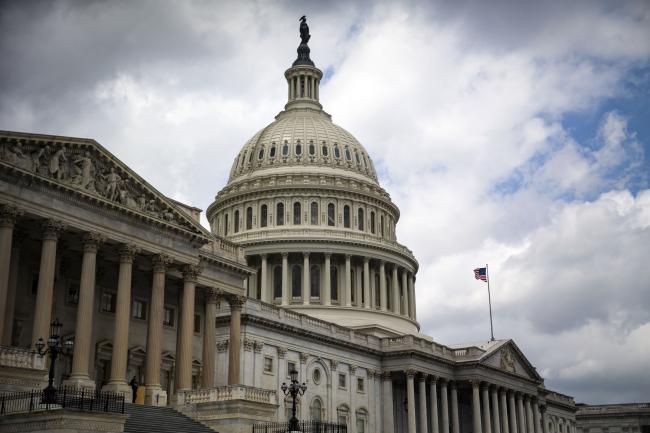(Bloomberg) -- Efforts to ease post-crisis banking rules probably will continue even if Democrats triumph in next week’s midterm elections and pressure regulators to reverse course.
While Democrats face long odds to flip the Senate, polls show they’re poised to gain at least the 23 seats needed to retake control of the House. That would put them in charge of committees that oversee financial matters, empowering them to summon agency heads and grill them about deregulation efforts championed by President Donald Trump.
“Democrats in charge will create a lot of noise, but it won’t affect the direction of change,” said Gerard Cassidy, an analyst at RBC Capital Markets. “There will be elevated pressure, but they’re still Trump’s agencies and will continue easing rules for the banks.”
While Democrats raising a fuss may weigh on bank shares in the short term -- analysts call this headline risk -- it won’t hurt profits, according to Cassidy. Most of the regulatory changes since Trump took office have been made by the administration’s unilateral tweaking of agency rules, rather than acts of Congress. The only legislative rollback of the 2010 Dodd-Frank Act was a limited easing of restrictions on all but the largest lenders, while the bulk of that post-crisis regulatory overhaul, aimed at firms deemed too big to fail, remains intact.
Independent Oversight
Regulators including the Federal Reserve and Office of the Comptroller of the Currency are independent bank overseers that write rules to implement the will of Congress. While agency heads must account for their actions, they aren’t required to heed the advice of lawmakers. The same agencies continued their post-crisis regulatory work during President Barack Obama’s final two years of office, even as they faced pressure from a Republican-controlled Congress.
“Throughout time, regulators have carried out their duties independently with conviction around what they believe is right and justified and with oversight from both parties,” said Kevin Fromer, head of the Financial Services Forum, a lobbying group representing the biggest U.S. banks. “And they regularly explain to Congress why they’re doing what they’re doing.”
Wall Street firms may be hedging their bets anyway, as Democrats received more contributions from the securities and investment industries than Republicans for the first time in a decade.
While most efforts at deregulation have focused on smaller firms not deemed to be systemically important, there are some tweaks in the works that would affect the largest banks. One involves the Volcker Rule, which banned risky trades by banks’ broker-dealer units. The financial industry has said it wants changes even more sweeping than what regulators proposed in May.
Read more: 1,000 Cuts to Dodd-Frank: Tracking Trump’s Wave of Deregulation
The Fed is also working on streamlining rules governing the amount of capital the eight largest U.S. lenders need to withstand unexpected losses during times of economic distress. Those systemically important banks also have been pushing regulators to recalibrate how much capital they’re required to have on top of regular minimums. As regulators work on those changes, they’ll face pressure from Democrats in Congress that will be commensurate with the size of their majority.
“Committees led by Democrats will call up agency heads consistently,” said Tom Davis, a former Republican congressman from Virginia who now works as a managing director in policy and government affairs at Deloitte. “It could slow down the agencies’ work a bit, but it won’t stop them.”
Such pressure effectively delayed the implementation of a previous version of the international capital regime known as Basel in the early 2000s. Even though U.S. regulators had spearheaded the revisions at the Basel Committee on Banking Supervision, they faced a barrage of criticism during prolonged congressional hearings, urging them not to implement the rules in the U.S. But the main reason lawmakers’ pressure on regulators was effective is that it was bipartisan and instigated by community banks that felt they were put at a disadvantage, according to Brian Gardner, a policy analyst at Keefe, Bruyette & Woods.
“It was not electoral politics, but an intra-industry dispute,” Gardner said. “And in such disputes, community banks usually win because they have the strongest political muscle.”
Fannie, Freddie
If Republicans manage to defy the polls and maintain control of both chambers, they probably won’t seek to further undermine Dodd-Frank, Gardner said. Instead, they might try to resolve the future of Fannie Mae and Freddie Mac, the housing finance giants under government conservatorship since the 2008 crisis, and weaken the mandate of the Consumer Financial Protection Bureau, he said.
“Legislatively, Republicans have already done what they could on financial issues,” said Chris Wolfe, a managing director at Fitch Ratings. “Regulators might be more emboldened under a stronger Republican hold on Congress, but we still won’t see a big shift in what they’re doing.”
If Republicans do lose the House, concerns about an incoming blizzard of congressional subpoenas is likely to prompt an exodus of administration officials. While that wouldn’t necessarily extend to independent agencies like the Fed or OCC, it could result in a brain drain at the Treasury Department and weaken its leadership role in encouraging the agencies to embrace the administration’s push to deregulate.
While the efforts so far have eased the burden on smaller banks, they’ve done little to meaningfully improve earnings for the largest firms, according to Dan Ryan, who leads banking and capital markets advice at PricewaterhouseCoopers.
The biggest lenders are still highly regulated, and Trump-appointed regulators haven’t shown signs of altering that main tenet of the post-crisis framework. Despite rules that went further than the international standards and harsher than what other jurisdictions implemented, U.S. banks have taken market share from their European rivals in the past eight years.
“Regulation has been good for the largest U.S. banks,” Ryan said. “The Trump administration has recalibrated, not eliminated, the tougher rules laid down after the crisis. That won’t change after the midterms.”
